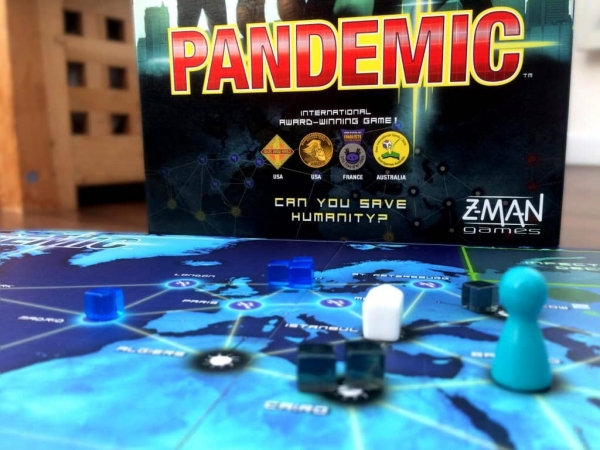A "hobby", as defined by Merriam-Webster's online dictionary, is "a pursuit outside one's regular occupation engaged in especially for relaxation." So hobby games are all about doing something different to what we usually do and doing it to relax. The definition of "serious", on the other hand, is a bit more complex. One option I found in Merriam-Webster's online dictionary defines it as "requiring much thought or work" or "not joking or trifling." So a serious gamer invests a lot of thought and work into their hobby and doesn't want people to make fun of it. It's all a bit confusing and that's why I want to look at the idea of a "serious hobby gamer" in more detail in this article. I also want to look at how hobby games have entered the mainstream and how that relates to the "seriousness" of the hobby.
I think we've all been there. We tell someone that we like board games and explain that we don't mean Monopoly or chess, but games that cover a huge range of different settings and themes and offer varying levels of game length and complexity. Their reaction will depend on the person and the situation, but it's very possible that they think we're a nerd who doesn't have a life. That's why some of us go on the defensive and call ourselves "serious gamers". We're not nerds. We take our hobby seriously. Board games are more than "just a hobby".
Of course, ultimately, all of us do play games for very similar reasons that other people pursue their hobbies. We want to do something that's different to what we do during the day. We want to relax, either alone, with a loved one or with a group of friends.
Mainstream Games
In fact, many of us want to share our joy of the hobby with more people. We want to introduce new people to it. We want board games to enter the mainstream and that's already starting to happen. Modern board games have already appeared on television, TV shows have been based on board games and many high street shops now stock more than just the obligatory copy of Monopoly or Scrabble. Not only that, people who don't know anything about the board game hobby have started to buy these games. Even if the growth isn't astronomical, it's clear that our community is growing.
That's why there are heated discussions about gatekeeping in our hobby. People argue about whether the term "gateway game" is appropriate or more likely to put people off. The term "serious gamer" also keeps popping up in that context. After all, someone who plays Pandemic or Wingspan can't be a serious gamer, according to some sections within our community at least. Anyone who hasn't yet played an 18xx or COIN game is just an amateur and not properly part of our hobby or so people claim.
Of course, that's rubbish. Whether you've played Patience or Twilight Imperium makes no difference. Fluxx is no worse a game than Dominion. If we want people to join us in our community, we have to make sure games that are easy to learn and quick to play become popular. Like with any hobby, everyone has to start somewhere. Nobody is going to be able to climb a V3 or 6a+ when they first start rock climbing. So let's make sure there are games that are easy to pick up.
Hobby Games for Everyone
So it's great to see Wingspan on television. It might be a bit too much for someone who literally has never played a modern hobby game before, even though I do think it's a game that you can learn as you play. It's also great to see Pandemic in bookshops. It's another game that might be a little too challenging for newcomers, but it's still doable. If designers and publishers can bring out more games that are easy to learn, then we'll see more of them in shops and the television.
 Pandemic can be quite a serious game
Pandemic can be quite a serious game
Some people are afraid that our hobby will get watered down with "simple" games that are "too easy". Yet, I don't see how giving newcomers more options to join in our hobby will have that effect. If we can increase the number of people actively playing and buying games, the better for the industry. It will grow the market and newcomers will probably want to introduce their own friends to this new-found hobby. As people become more familiar with the various mechanisms you find in games, they will want to play "heavier" games themselves. So their demand will increase as well.
I can only see positives for our community and the hobby game industry at large. I think the term "serious" should be used in the context of taking the goal of bringing more people into the fold more "seriously". We all need to be open to all sorts of new games. Sure, not every game will be for us, but more games is never a bad thing when it comes to growing our community and industry. If we can, we should also introduce more people to our hobby or at least not be averse to our community growing.
What About You?
So what do you think about all of this? Do you want more people to enjoy hobby games? How do you think we can achieve that? What are the games you teach friends who have never played a modern board game before? Are you worried that growing our community will mean a flood of light games? As always, please share your thoughts in the comments below. I'd love to hear from you.
 Games
Games How to resolve AdBlock issue?
How to resolve AdBlock issue? 

















